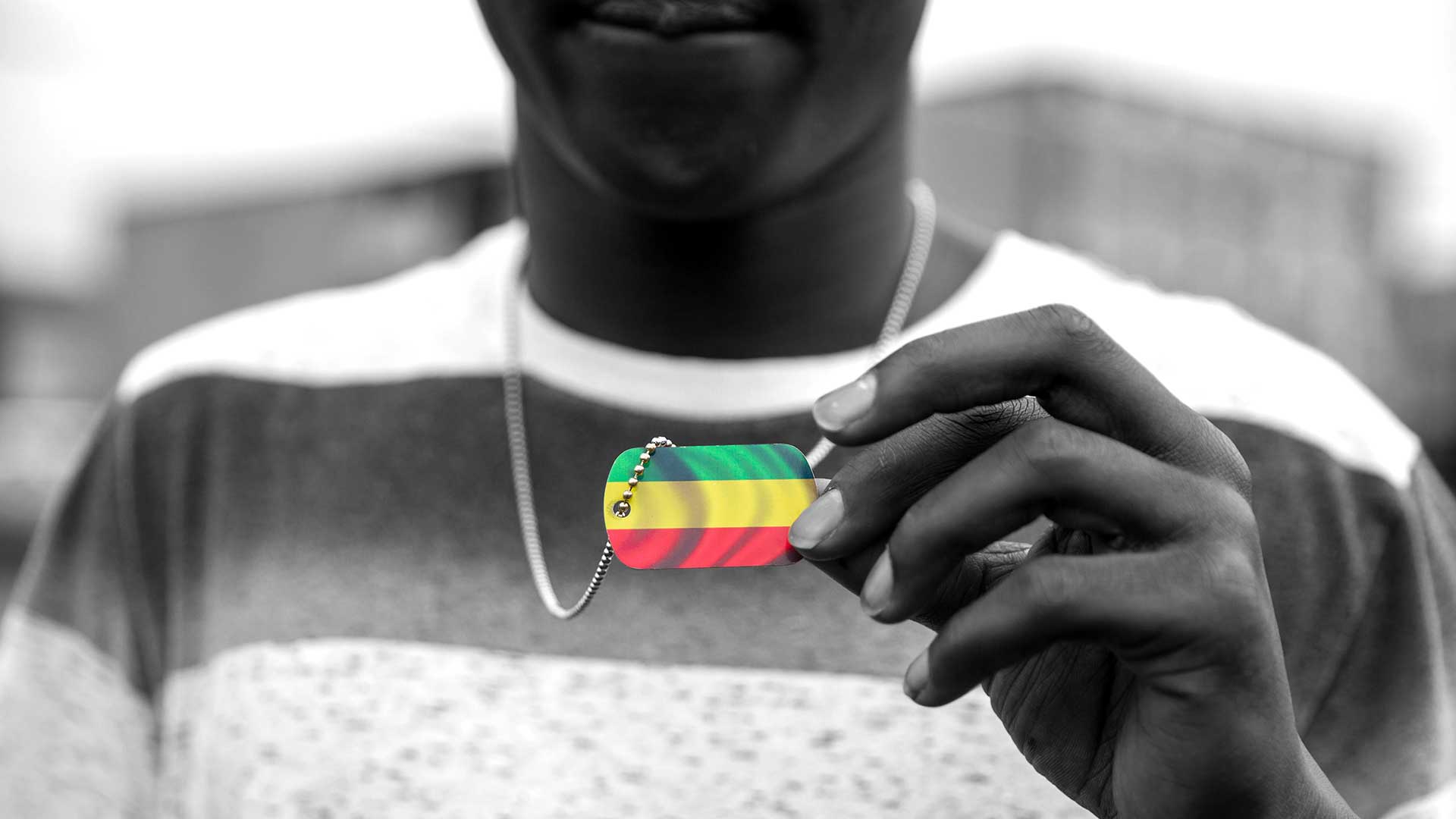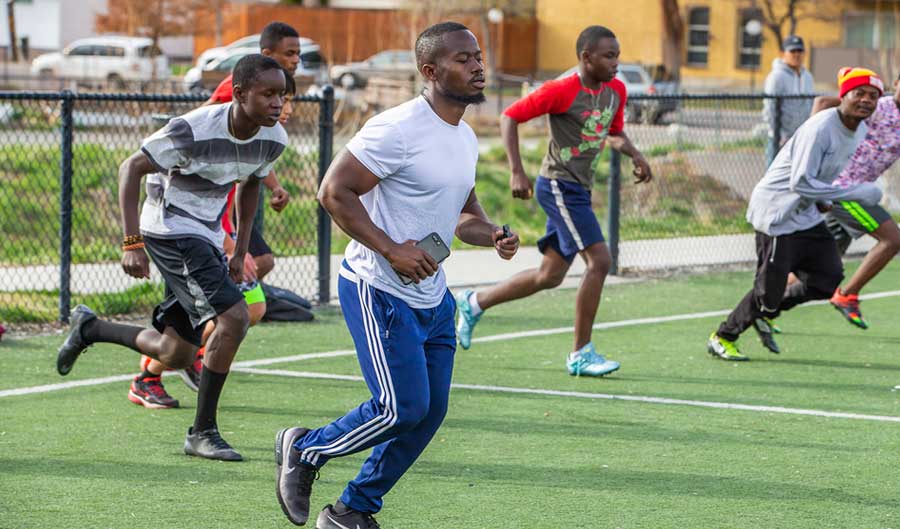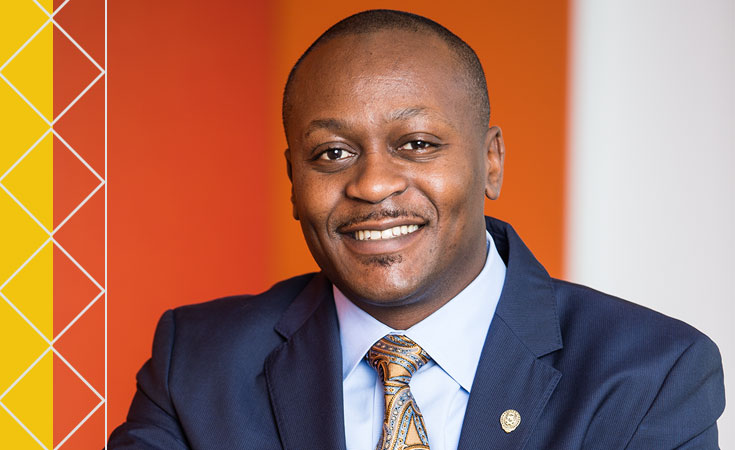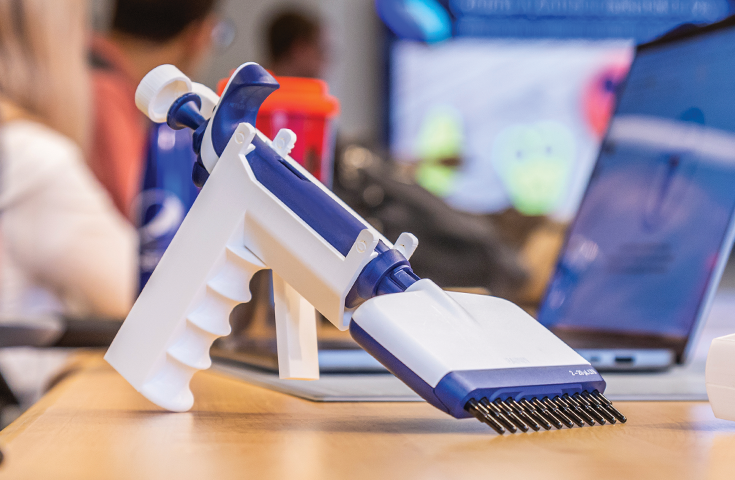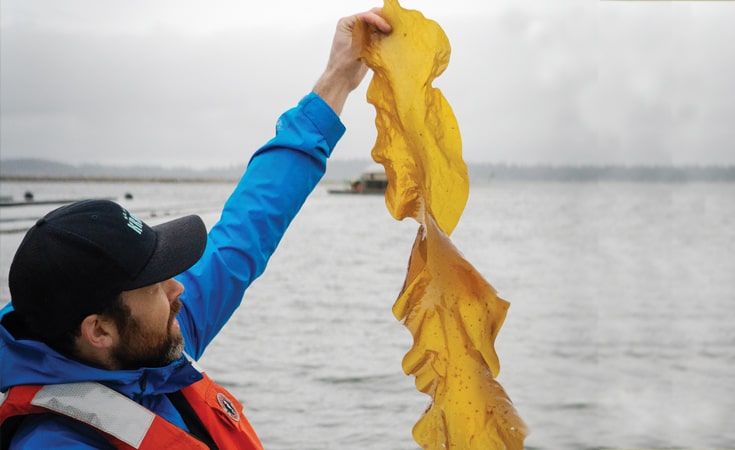Amadou Bility ’14 survived a brutal civil war in his native Liberia. Now, he’s using his own experiences — and skills gleaned from Johnson & Wales — to help young men in one of Denver’s toughest neighborhoods escape the cycle of violence.
ASK MOST ANY DENVERITE ABOUT COLFAX AVENUE, and they’ll likely tell you with devilish pride about how it was once called the road “the longest, wickedest street in America." The provenance of that quote — not to mention the quote itself — has since been called into question, but the fact that it was able to take root in the Mile High City’s mythology says plenty about the dim view locals have historically taken of the nearly 50-mile thoroughfare.
Recently, though, Colfax’s reputation has benefitted from a reboot. Toward the west, bustling breweries now crowd out blighted hotels; the upscale dinner-and-a-movie cinema chain Alamo Draft-house built a theater there; Santa Fe, New Mexico’s Meow Wolf will bring its trippy, millennial-beguiling interactive art to the shores of the street in 2021. But development thins as you drive east. By the time you reach the last stretch of the road before it enters neighboring Aurora, signs of gentrification have disappeared. Here, in the East Colfax neighborhood of Denver, crime still courses through the community: In 2019, the area posted the eighth-highest violent crime rate in the city, and it remains an active center of gang activity.
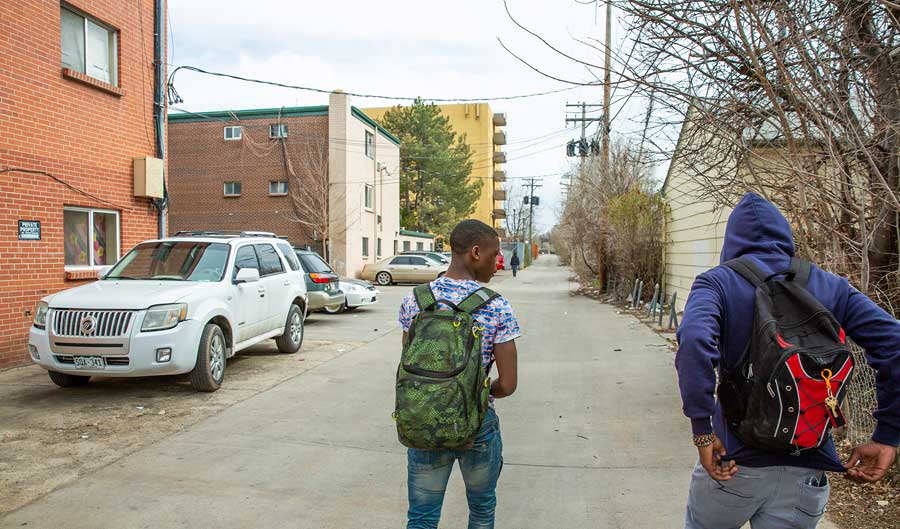
It’s ironic, then, that many seek sanctuary in East Colfax — specifically, at Street Fraternity , a nonprofit co-founded by Johnson & Wales University Denver Campus alumnus Amadou Bility '14. Housed in the basement of a Disabled American Veterans (DAV) building, Street Fraternity’s goal is to provide young men a peaceful oasis, a safe harbor from the conflicts and pressure of the neighborhood. "There’s so much happening on the outside," says Max Tun, a 20-year-old who’s been visiting Street Fraternity for almost a decade. “There’s gang violence. There are people addicted to drugs. School can be a pain in the back. What’s going on at home can stress you out. You come here and you get free from all of that."
Street Fraternity began — and remains — committed to helping violent males age 14 to 25. By virtue of its location, however, the nonprofit has become especially important to refugees and immigrants adjusting to life in the United States. (East Denver and Aurora are popular resettlement areas; Tun, for example, moved from Thailand in 2008.) Street Fraternity boasts four founders, but it’s with this particular demographic that Bility — who was displaced from his home country by a 14-year civil war — can personally empathize. "Knowing the kids at Street Frat have experienced something that I’ve experienced, I can establish communication to trust and come to me instead of taking the violent route,” Bility says. “Maybe I know better routes that will take them where they need to be."
MANY CAREERS AGO, Dave Stalls won the Super Bowl. Two of them, actually. Growing up in Wisconsin without his father, Stalls found male role models through sports: first ice hockey and then football. The latter led him to the University of Northern Colorado, the Dallas Cowboys (he helped Roger Staubach win an NFL title in 1978), and the Los Angeles Raiders (he was a defensive lineman during the team’s third championship, in 1984). After his football career ended, Stalls tried a varied portfolio of careers — marine biology, investment banking, telecom — before entering the nonprofit world, where he eventually became president and CEO of Big Brothers Big Sisters of Colorado (BBBS).
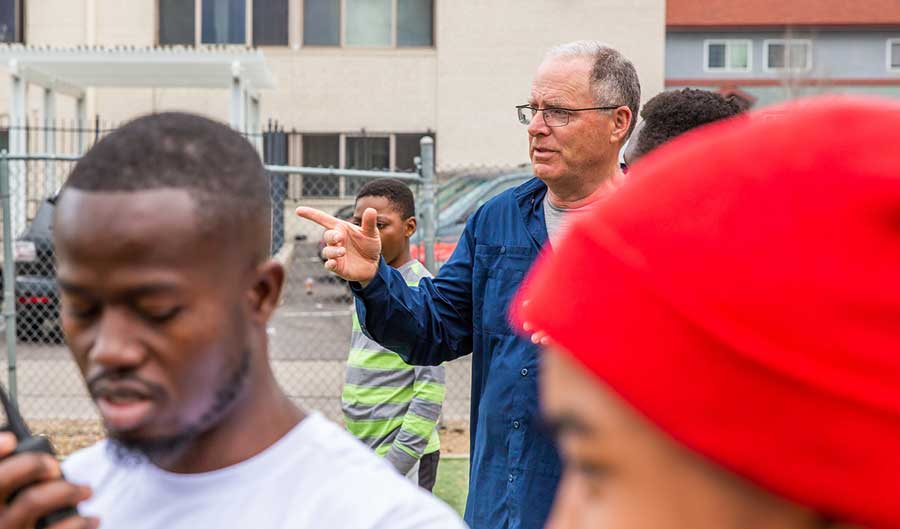
While with BBBS in 2011, Stalls was invited to speak to JWU Denver’s Leadership Academy, a six-week program that connected students with local executives. Public motivational speaking was a standard occurrence for Stalls; he even had a turnkey presentation titled “What is Leadership?” But Stalls remembers being moved during this appearance by a student who said that after graduating, he planned to become a lawyer at the International Criminal Court in The Hague, Netherlands, so he could prosecute war criminals like those who had devastated his home country. Stalls met with the student afterward. “He shared his life experience,” Stalls says, “the challenge of growing up in a country where the leader of the country is a leader of genocide.”
Amadou Bility was born in Liberia in 1988. A year later, the country erupted into civil war when forces led by Charles Taylor and Prince Yormie Johnson attempted to overthrow the government. Taylor was eventually elected Liberia’s president in 1997, yet his reign did little to quell unrest. Three years later, rebels rose up against Taylor’s regime, and three years after that, the United Nations indicted the embattled president for crimes against humanity. Taylor resigned and was later convicted at The Hague. Nevertheless, during Liberia’s 14-year civil war, approximately 200,000 citizens died and 1.5 million —including Bility — were displaced.
Unwilling to leave the home they’d made in Liberia’s capital city of Monrovia but terrified for the safety of their son, Bility’s parents sent him to live with his grandmother in a refugee camp in neighboring Guinea. Later, he moved to Kankan, Guinea, with an uncle to attend a better school away from the turmoil of the camp. When Bility was in grade school, conflict in Liberia cooled temporarily. It was time, his uncle and grand-mother decided, to meet his parents.
Although Bility didn’t have the necessary papers to enter the country, family and friends helped smuggle him into Liberia. It was at the border that Bility first confronted the atrocities of the war. “It was traumatic and at the same time an eye-opening experience,” Bility says. “I could see kids — probably 10 or 12, around my age — with AK-47s hanging around their bellies and guarding the gate,” though the barrier between the two countries was only a piece of rope strung between two poles. The children were members of rebel groups. Bility’s adult guides warned him: Don’t look left. Don’t look right. Just walk straight ahead and meet us under that tree on the other side of the border.
“I crossed my fingers and just hoped no one would tell me to come back,” Bility recalls. “I was very, very scared. But whatever it takes to see my parents, right?”
During his displacement, the longest period Bility spent in Liberia came when he was 10 years old. For an entire summer, Bility watched his mother spend her days selling clothes in the marketplace so the family could earn money for food. At home, she was constantly pulling Bility onto her lap and rocking him like a baby. “I would be like, ‘I’m 10, let me go,’ ” Bility says. “No, she wouldn’t. She missed me so much. It was beautiful to spend those three months with her. It was probably the best three months of my life.” It was also the last time Bility saw his mother. She died two years later during childbirth.
I may not be the one who will decide on war crime cases, but I’m pretty sure I’ll be able to inspire the next generation who can then pursue those dreams.Amadou Bility ’14
2
Thy Brothers' Keeper
IN 2005, LIBERIA finally fully emerged from civil unrest and held a general election. With peace spreading throughout the country and his father’s petroleum business doing well, Bility returned to Monrovia to finish high school and eventually joined his brothers in the United States, where they followed in their dad’s footprints by attending JWU Denver. (His father did not graduate, but both brothers did: Sidikie Bility ’10, studied international business while Lyee Bility ’12 majored in management.
“Amadou was the most serious out of his father and brothers,” remembers James Moul-ton, a history and political science professor at JWU Denver. “He was just very focused on what he wanted to do.”
Bility would graduate with a degree in criminal justice, intending to go to law school on his way to The Hague. But he credits JWU Denver for expanding his worldview through programs such as the Leadership Academy, which connected him with socially responsible corporations like Chipotle; local nonprofits, including the Denver Homeless Coalition; and, of course, BBBS’ Dave Stalls.
When he met Bility, Stalls was already planning to leave BBBS to concentrate on street-level advocacy. During the 2000s, he’d led a nonprofit called The Spot, an urban gang center that operated at night. The experience had shown him what tactics proved effective with at-risk young men. For one thing, there was no clean cutoff age of 18 or 21 — they need-ed access from their teens until their mid-20s. They also could not be counted on to attend scheduled classes or programming; they were unlikely to show up on time (or at all) for an event that had a strict start time of, say, 5 p.m. Finally, they gravitated to places where they could drop-in randomly and feel safe, unthreatened by the outside world or restrictive rules.
After meeting at JWU Denver, Stalls introduced Bility to two others who had shown a passion for that sort of mission. It took two years to raise funds and find a landlord willing to rent to an organization dedicated to serving violent young men, but on April 1, 2013, Street Fraternity debuted in the basement of the Disabled American Veterans’ office. The space is open to drop-ins afternoons into evenings, and features a room for every mood. There’s pingpong for fun, meditation for reflection, a recording studio for creativity, computers for homework and applying for jobs, and a gym with weights and punching bags for relieving stress and anger. Mostly, though, Street Fraternity aims to be a stable presence. “Our biggest goal,” Stalls says, “is to observe and listen.”
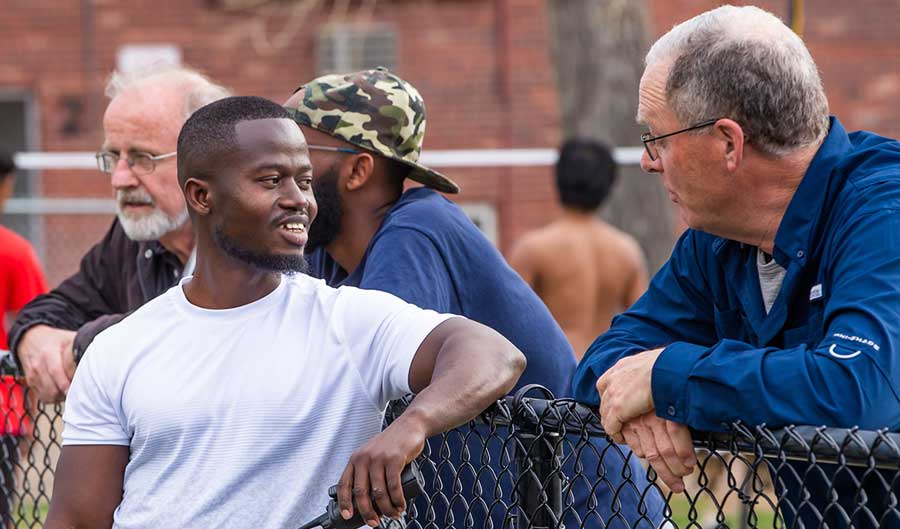
Street Fraternity had intended to function on a referral basis. However, word of mouth spread and more and more immigrants and other troubled young men began showing up. “What has stayed the same is that core mission,” says Yoal Ghebremeskel, Street Fraterni-ty’s co-founder and executive director. “We’re a drop-in, walk-in space. That’s what’s needed for this demographic.” Where once the nonprofit intended to accommodate a max of 20 people, it now welcomes up to 50 a night.
Because of financial constraints, Street Fraternity could only afford to pay one employee for years. Still, Bility continued to serve as an unpaid volunteer and board member until he finally was made the program specialist. “There are very few young men I’ve met in my life who have stated intent and followed through like Amadou has,” Stalls says. “For days, weeks, years, Amadou gave himself over to Street Fraternity. His natural ability to connect with our young men — through language, culture, and religion — was a real gift.
STREET FRATERNITY — “the Basement” to its founders — doesn’t seem very welcoming from the outside. The only way to reach the entrance is via the back alley, through a heavy metal door, and down a flight of stairs. Once inside, however, the camaraderie fostered by its founders quickly overwhelms you.
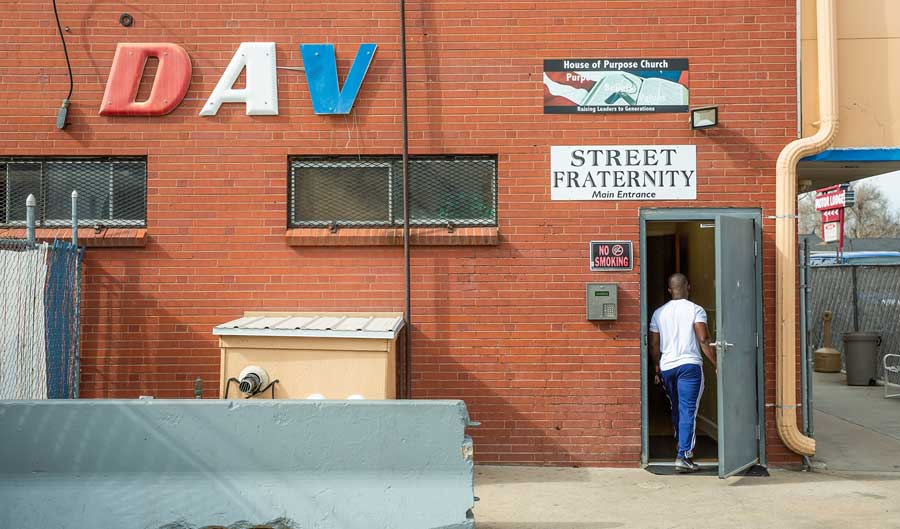
The dozen or so there one night are mostly gathered in the kitchen, scarfing down grilled cheese sandwiches and pizza. “Oh no!” exclaims Levon Lyles, one of Street Fraternity’s co-founders. “Don’t do it!” He’s playing a game of Jenga with two adolescents — and displaying a fair amount of gamesmanship as one of them tries to remove a block. The tower wobbles, yet the young man survives. In the back, two volunteers help renovate the recording studio. On many nights, five or six people will gather around a computer and laugh while watching YouTube videos from back home
If the vibe of the place feels more like a clubhouse than a mission, that’s by design. Street Fraternity does host occasional talent shows and field trips, and every Thursday it partners with local rescue groups to give fresh food to anyone who stops by. But mostly, Bility and the other founders strive to remain that steady presence. Though that stability, through just being there, they provide examples of brotherhood and personal growth. “For many of our guys, they don’t have a father who’s at home,” Ghebremeskel says. “They don’t have that male role model in their lives. And they’re seeing Amadou with his baby and his wife. What does that mean to a young man who’s struggling with violence at home and in the neighborhood?”
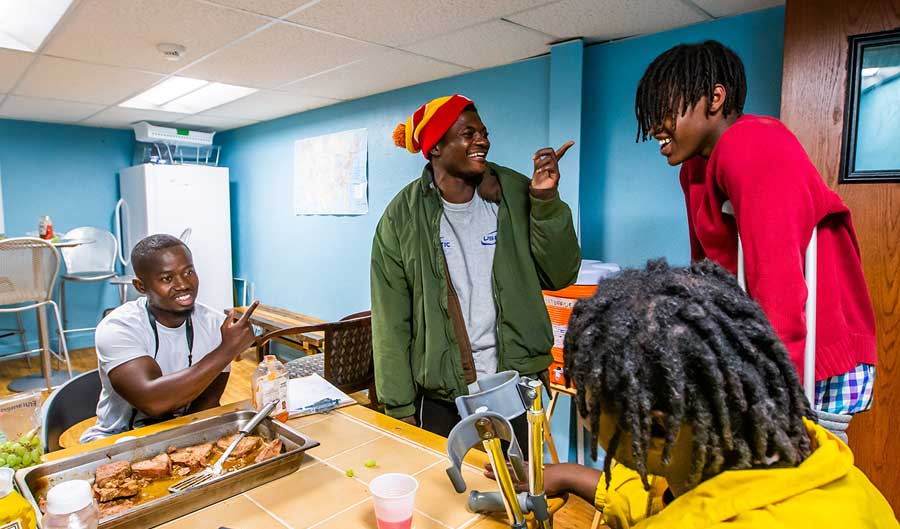
Bility’s influence reveals itself in small ways, such as when he helped Tun navigate the legal system after a car wreck. “Amadou is like an older brother to me,” Tun says. “He’s someone we can talk with, we can hang out. At the same time, when I’m seeking counsel, I can still talk to this guy.” Some situations, however, require more than friendly advice. Another Street Fraternity regular was being bullied and fighting at school. Educators, knowing the student often visited the Basement, called Bility and asked him to intervene.
So Bility organized a meeting at the nonprofit to address different strategies of resolution that the kid could employ to avoid conflict. “They need to realize that they have a harder road ahead,” Bility says, “but that getting suspended could really mess up their future. Think about the big picture — bullies could come between you and your dreams.”
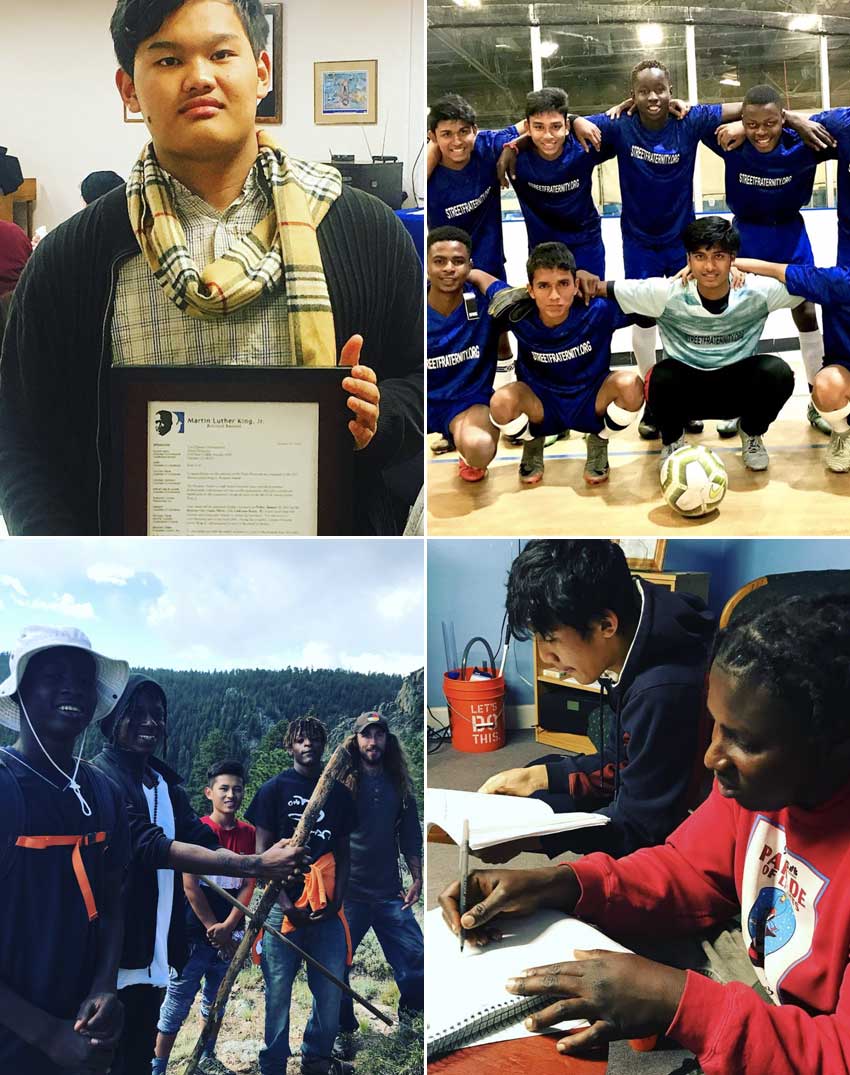
They might not be trials at The Hague, but such interactions reinforce that the direction Bility’s life has taken is the correct one. “I’m on the ground with people who experienced the violence that I experienced,” Bility says. “How can I be there for those people? Just share my story. Tell them that they’re not alone. I may not be the one who will decide on war crime cases, but I’m pretty sure I’ll be able to inspire the next generation who can then pursue those dreams.”
JWU in LIBERIA
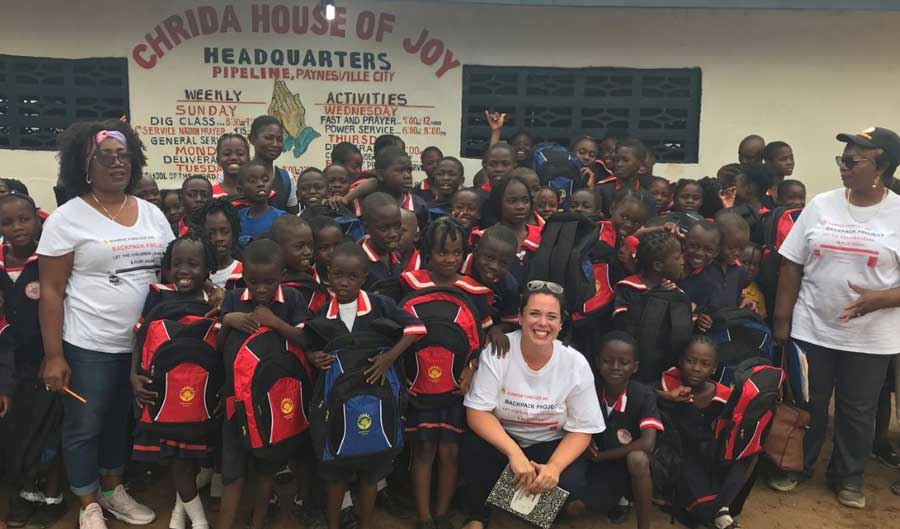
Carla White Ellis (front, centered), assistant professor in the John Hazen White College of Arts & Sciences, traveled to Liberia this summer. She and her colleagues from SunRise Forever Inc., a non-governmental non-profit organization that prioritizes humanitarian, educational and developmental activities within Rhode Island and Liberia, delivered 750 backpacks filled with school supplies such as notebooks, pens and pencils to underprivileged children in five different counties and 10 different elementary schools.
